Feltner v. Columbia Pictures Television, Inc.
United States Supreme Court
523 U.S. 340, 118 S.Ct. 1279 (1998)

- Written by Cynthia (Anderson) Beeler, JD
Facts
Columbia Pictures Television, Inc. (Columbia) (plaintiff) licensed several television series to C. Elvin Feltner (defendant), who owned Krypton International Corporation (Krypton) (defendant) and three television stations (defendants) in the Southeastern United States. After the defendants became delinquent in their royalty payments, Columbia entered into negotiations with them to restructure their debt. When the negotiations failed, Columbia terminated the license agreements. The stations continued broadcasting the television programs. Columbia sued for copyright infringement under the Copyright Act of 1976 (Copyright Act), 17 U.S.C. § 101 et seq. Columbia exercised its option under § 504(c) of the Copyright Act to recover statutory damages between $500 and $20,000, “as the court considers just,” in lieu of actual damages. Feltner sought a jury trial on the issue of statutory damages, which the federal district court denied. Instead, the district court held a bench trial and awarded statutory damages of $20,000 per act of infringement, resulting in a statutory damages award of $8,800,000 in Columbia’s favor. Feltner appealed to the United States Court of Appeals for the Ninth Circuit, which rejected his argument that he was entitled to a jury trial for statutory damages. The United States Supreme Court granted certiorari. Feltner argued that the Seventh Amendment gave him the right to a jury trial. Columbia opposed Feltner, arguing that statutory damages were equitable and that the Seventh Amendment therefore did not apply.
Rule of Law
Issue
Holding and Reasoning (Thomas, J.)
Concurrence (Scalia, J.)
What to do next…
Here's why 907,000 law students have relied on our case briefs:
- Written by law professors and practitioners, not other law students. 47,100 briefs, keyed to 996 casebooks. Top-notch customer support.
- The right amount of information, includes the facts, issues, rule of law, holding and reasoning, and any concurrences and dissents.
- Access in your classes, works on your mobile and tablet. Massive library of related video lessons and high quality multiple-choice questions.
- Easy to use, uniform format for every case brief. Written in plain English, not in legalese. Our briefs summarize and simplify; they don’t just repeat the court’s language.





